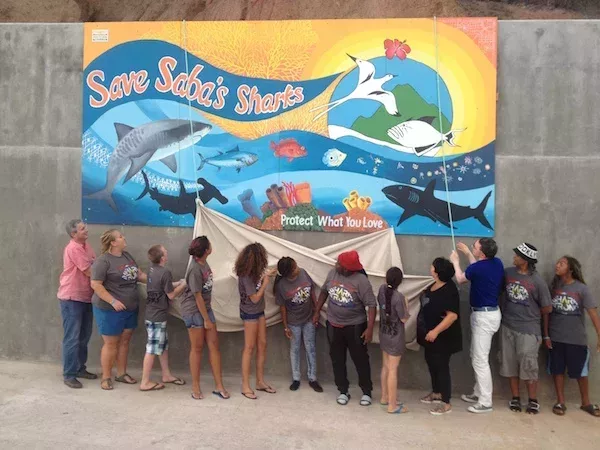During her visit to Saba and Bonaire, Dutch State Secretary of Economic Affairs, Mrs. Sharon Dijksma, opened the “Yarari” marine mammal and shark sanctuary. The populations of sharks worldwide are in sharp decline and therefore need extra protection against illegal fishing and bycatch in regulated fisheries. The local nature conservation and fisheries organizations will be involved in the protection. With this eleventh shark sanctuary in the world the Netherlands will actively protect sharks in the Caribbean Sea. The name of the Sanctuary “Yarari” is an Taíno Indian word, meaning ‘a fine place’
More sharks, more fish
State Secretary Dijksma “This special sanctuary ensures the protection of these animals in the waters around Saba and Bonaire. Sharks are important not only for tourism but also for fishing. When there are more sharks, there are – contrary to what you might expect – also more fish”. Commissioner Chris Johnson of Saba: “I am very pleased that the two governments of Saba and Bonaire, along with the Government of the Kingdom of the Netherlands have realized the importance of this issue and the favorable impact that this has for the islands and the region as a whole.” Fish stock research by IMARES has shown that a decrease in number of sharks, as top predators, leads to a disturbed natural balance in the sea. This can affect the overall fish population, and good fish stocks are important for fishermen on the islands that depend on fishing. Tourism also benefits from coral reefs with sharks.
Marine Mammals
The Yarari Sanctuary, which encompasses all the waters around the islands including the Exclusive Economic Zone or EEZ, will not only protect sharks, but will also provide a haven—a ‘fine place’— for marine mammals—the whales and dolphins. Many species of whales and dolphins are known to inhabit the waters around these islands, including orcas, humpback whales and sperm whales, more than twenty different species. Humpback whales spend the winter months in the warm Caribbean waters where they calve and suckle the baby whales during their first few months until they are strong enough to begin the trek to their feeding grounds in the cold Northern Atlantic waters off the Easter shore of the US and Canada, Greenland and Iceland, as well as Northern Europe. The Sanctuary is intended to focus research of the various marine mammal populations to learn more about their lives and the threats they may be under so we will learn how best to protect them. Like sharks, marine mammals are important for tourism. The Yarari Sanctuary will form part of a network of marine mammal sanctuaries in the region, including the Stellwagen Bank National Marine Sanctuary in the northern USA, an important summering ground for humpback whales, the French Caribbean “Agoa” Sanctuary and the Dominican Republic Marine mammal Sanctuary, which includes the Silver Banks.

